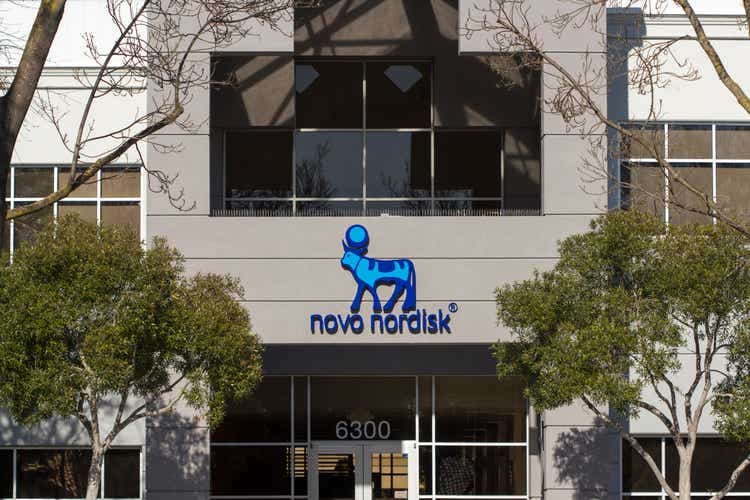Novo Nordisk falls after safety signal linked to weight loss drug class

hapabapa/iStock Editorial via Getty Images
Novo Nordisk (NVO) shares came under pressure on Thursday after reports of a thyroid cancer safety signal linked to glucagon-like peptide-1 (GLP-1) receptor agonists, which represent the company's popular weight loss agent semaglutide.
Semaglutide is the active ingredient of Danish drugmaker's obesity therapy Wegovy, Rybelsus, and its diabetes drug Ozempic.
The EU drug regulator, European Medicines Agency (EMA) raised the safety signal to monitor potential adverse events further.
GLP-1 drugs from Eli Lilly (LLY), AstraZeneca (AZN), and Sanofi (SNY) are also linked to the safety signal, which, however, does not mean that the drugs are the reason for the reported adverse events.
Novo Nordisk (NVO) shares were trading ~2% lower on Thursday after Danish media outlet B.T. reported the EMA safety signal.
When contacted, Lars Otto Andersen-Lange, the company's media relations director, told Reuters that the B.T. report was based on a May 8 statement from the EMA.
"Patient safety has top priority for Novo Nordisk, and we take all reports about adverse events from use of our medicines very seriously," Andersen-Lange said.
An EMA spokesperson said that in January, the regulator's safety panel "discussed a signal for medicines pertaining to the glucagon-like peptide-1 (GLP-1) receptor agonists class, including medicines containing the active substance semaglutide."
The discussion followed a study indicating an increased risk of thyroid cancers when GLP-1 receptor agonists are used in patients with Type 2 diabetes.
The companies linked to the safety issue are expected to provide supplementary information to the EMA before July 26, as requested by the agency in April.
More on Novo
Recommended For You
Comments (7)
Have a tip? Submit confidentially to our News team. Found a factual error? Report here.

This is non-news for the stock.

All of the new class of diabetes management injectable drugs have an FDA required blackbox warning about potential thyroid cancer but, as with nearly all drugs, the adverse reactions were seen or suspected at much higher doses and durations than nearly all humans would take in normal dosage.all of these drugs are very effective at diabetes management which is why they have been used. The use of any medication to produce fast results - such as weight loss - always comes w/ risks. Other risks are much higher than the thyroid cancer risk. These injectable drugs are 1X/week applications and replace other diabetes management drugs, all of which also carry risks.
